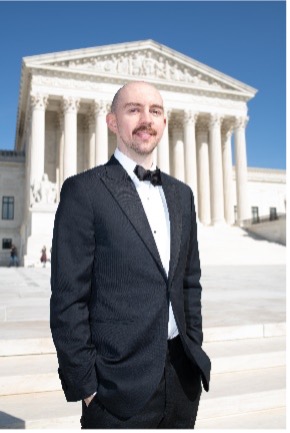Daniel Webb
2020 Pegasus Scholar
 Dressed in our finest black tie on a warm spring evening, we sat in the imposing Court Chamber of the Supreme Court of the United States, where so many historic cases have been heard. In what I found to be the most surreal moment of my Scholarship, Chief Justice John Roberts began to call the name of each Pegasus Scholar, to welcome and congratulate us in front of an audience of the American Inns of Court’s distinguished guests. It was the start of an awards ceremony which we were honoured to attend. After such a welcome, we were lucky enough to meet award recipients, dine in the marble-columned Great Hall and even chat briefly with Justice Sonia Sotomayor.
Dressed in our finest black tie on a warm spring evening, we sat in the imposing Court Chamber of the Supreme Court of the United States, where so many historic cases have been heard. In what I found to be the most surreal moment of my Scholarship, Chief Justice John Roberts began to call the name of each Pegasus Scholar, to welcome and congratulate us in front of an audience of the American Inns of Court’s distinguished guests. It was the start of an awards ceremony which we were honoured to attend. After such a welcome, we were lucky enough to meet award recipients, dine in the marble-columned Great Hall and even chat briefly with Justice Sonia Sotomayor.
The Celebration of Excellence dinner capped the first week of our Pegasus Scholarship programme. My co-scholar and I spent that first week in Washington D.C. and the subsequent five weeks mainly in New York City, with trips to courts in Delaware, Philadelphia, and New Haven. Overall, the Scholarship was an extraordinary opportunity to learn about the American legal system, an opportunity which afforded me so many valuable insights. In particular, I would highlight the insights into judging, civil advocacy and the importance of mooting.
As to judging, I was not expecting quite the level of exposure we would be given to the work of judges. From the very first day when we sat in the chambers of Judge Thomas Ambro in Wilmington, Delaware, we learned about the entire life of a case from the judicial viewpoint. The judge and his clerks (judicial assistants) talked us through the receipt and initial consideration of briefs (pleadings or applications), up to preparation for the hearing and the subsequent judgment writing process. We discussed varying judicial philosophies and approaches to deciding cases, and how Judge Ambro’s perspective had evolved since taking the bench.
This continued when we later spent a week in the chambers of Magistrate Stewart D Aaron of the United States District Court, Southern District of New York. Here we were made to feel part of the team, attending daily team calls and dialling in on most of the Judge’s cases. We observed the wide variety of work a Magistrate deals with. In particular, I enjoyed reading and discussing the very detailed briefs and oral submissions in a motion to dismiss, which raised points of construction and jurisdiction.
We witnessed many other types and styles of civil advocacy during our programme, which provided instructive insights for my junior practice. For example, oral submissions at the U.S. Court of Appeals for the D.C. Circuit were time limited to about 15 minutes. Advocates were often hard pressed to make submissions while also fielding the barrage of interventions from three appeal judges. I found that some advocacy styles worked under this pressure, while others did not. In contrast to such brief submissions, the closing arguments in a personal injury trial in the Philadelphia Court of Common Pleas were lengthy, and (for once) had the colour and drama American television had led me to expect.
A theme that ran through many of our conversations with attorneys and judges was the pre-eminence of mooting to legal practice in America. This was an entirely unexpected insight. Whilst practitioners in the U.K. might leave mooting behind when they finish law school, mooting was described as an indispensable part of case preparation for U.S. lawyers. We saw various moot courts, from the permanent moot court in our host firm’s office, to perhaps the most prestigious in the country, the Georgetown Law Supreme Court Institute. Made to resemble the Court Chamber of the Supreme Court, every matter to be heard in the Supreme Court is mooted at Georgetown by one of the parties, on a strictly confidential basis. The moot judges are invariably those with considerable Supreme Court and subject matter experience. It seemed to be part of the fabric of legal life in the United States that practitioners would make time to moot their own cases or act as a judge in someone else’s, in order to improve the quality of the final submissions. Overall, I concluded that the benefits of mooting at such a level might be something UK clients, and courts, might be missing out on.
It was truly a privilege to spend 6 weeks in the United States learning about the American legal system and I am enormously grateful to all those who helped make my experience so special, including all the judges and attorneys who gave their time and welcomed us so warmly. I would like in particular to thank Cindy Dennis at the American Inns of Court and those at MoloLamken LLP, who worked so hard to craft such a varied and interesting programme. It was a completely unique experience, one which I am sure will pay dividends to my practice going forward.